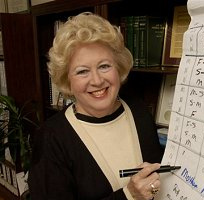MEDIATION OF FAMILY BUSINESS AND PARTNERSHIP DISPUTES
A dispute in a family business is a family dispute. Family businesses are complicated and conflict within one has ramifications outside the workplace. Failure to resolve conflicts in a family business can destroy a good business and/or a good family. No one wants to kill a goose laying golden eggs for those folks we not only work with, but love.
Partnerships are like family. Some partners when splitting up say they feel like they have been through a divorce. They have!
Mediation, the process that helps people in dispute resolve their conflict with the help of a trained impartial third party mediator, helps the parties negotiate a settlement of the conflict instead of litigating the conflict or destroying the business.
Mediation is quicker, cheaper, and, most importantly, it allows the partners or family members to be in control of the outcome.
If the conflict has an emotional component, and what family business or partnership conflict doesn’t, the parties can be in stress and limbo for a long time. When adult siblings or cousins fight, the whole family is deeply hurt.
 If the conflict could lead to a legal process, you best try mediation before you commence the lawsuit. In Tennessee, you may find your judge ordering you to try it. If mediation doesn’t work, the judge cannot know why it didn't, nor what had been negotiated. Mediation is confidential. You have nothing to lose and a lot to save. You retain all of your legal rights.
If the conflict could lead to a legal process, you best try mediation before you commence the lawsuit. In Tennessee, you may find your judge ordering you to try it. If mediation doesn’t work, the judge cannot know why it didn't, nor what had been negotiated. Mediation is confidential. You have nothing to lose and a lot to save. You retain all of your legal rights.
Perhaps the most prized attribute of mediation is the absolute confidentiality aspect. Litigation is a public forum -- open to your creditors and competitors. A family business needs to keep its business to itself. Besides business, it is personal, and doesn’t need exposure in the very public legal arena.
What kinds of family business or partnership disputes are good for mediation? Succession issues, allocation of responsibilities, someone not pulling his or her own weight, someone not able to perform, contribution to capital, when someone leaves, stock issuances, and dividend distribution. How extended is this family? What happens to a business when a principal gets divorced?
Dissolution of the partnership requires addressing many issues: contributions to capital, name changes, asset distribution.
None of this is easy.
Any time a continued relationship is desired or required after the resolution of the conflict, mediation, being a cooperative process, heightens the chance of a cooperative continuing relationship.
Yes, I am a trained mediator, but I have been associated with a family business for 42 years! Been there -- done that!
Thank you for your attention.
I prefer the facilitative method, facilitating negotiations between the parties face to face rather than exclusively shuttling back and forth between separated parties. Clients report they feel more involved in the decision-making process, each having had a chance to be heard. Facilitative mediation hastens trust of the mediator; there is less wondering and worrying what’s being said in the other room.
In facilitative mediation, each client gets to tell his or her story to the other. Options for possible resolution get listed (I use a flip since I don’t know if the person sitting in front of me is a right brain or left brain learner), discussed, and chosen. And yes, this process allows each disputant to observe just how each may be perceived by a judge or jury. Facilitative mediators may meet in private sessions with each side to go through a specific process that helps the attorney chart and evaluate the case for the client.
Transformative mediation, which uses the facilitative method, is more concerned with the process of conflict resolution than the resolution itself. This is often contrasted with evaluative mediation that is so "resolution focused" you may see the mediator evaluating the case for each side and then telling them how they ought to settle. There is a form of ADR called Early Neutral Evaluation that does just that. Employing empowerment and recognition as techniques, transformative mediation hopes to transform the clients from angry, self- centered, win/lose positioned disputants to cooperative, acknowledging, now and future focused, responsible ones. And maybe even get to resolution. It allows a lot of leeway for the clients to frame the issues and the discussion. Transformative mediators use the facilitative style. Thus, should the clients not resolve all issues in that mediation session, the likelihood of them being able to do so before resorting to litigation is high. According to Professor Robert Baruch Bush of Hosta University and his co-author Joseph Folger in their book, The Promise of Mediation , the mediation process should promise something more to the client than just closing the file.
Perhaps my style is best described by Professor/attorney/mediator David Hoffman in his article "Confessions of a Problem-Solving Mediator" in the 1999 Volume 23 Number 3 newsletter of the Society of Professional in Dispute Resolution. He contrasted transformative mediation with problem solving and suggested we experienced mediators intuitively engage techniques that fall somewhere in between.
Again, the trick and talent of the experienced mediator is to know what style to use -- and when.
Certification of mediation specialist is not currently available in Tennessee. Approved by the Tennessee Supreme Court’s Alternate Dispute Commission under its Rule 31 for civil law and family law cases.

